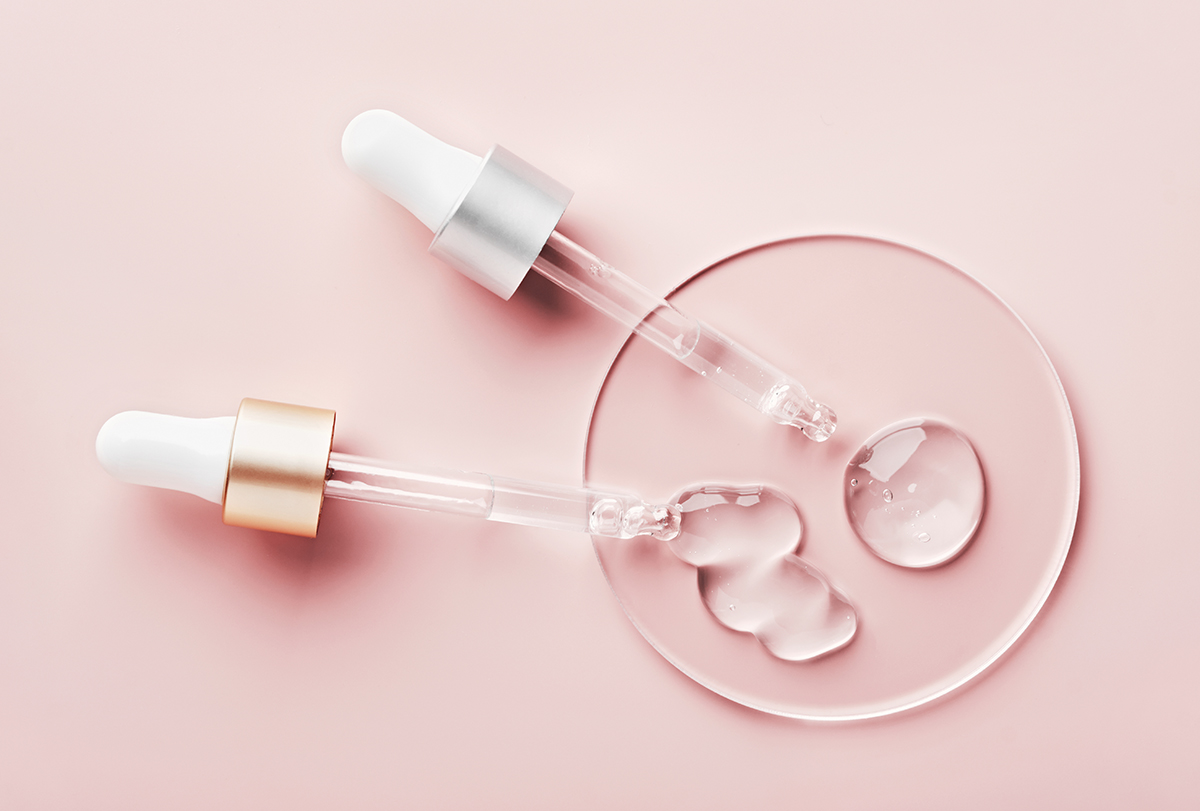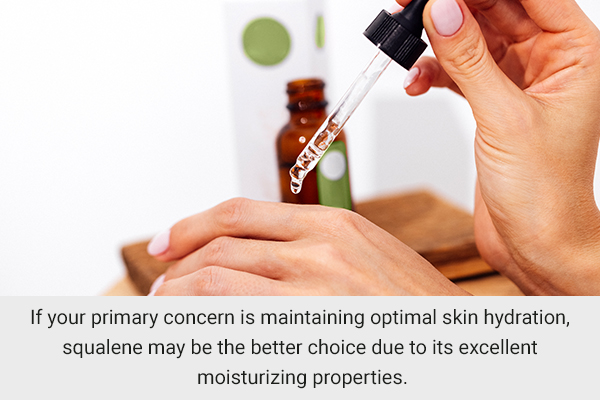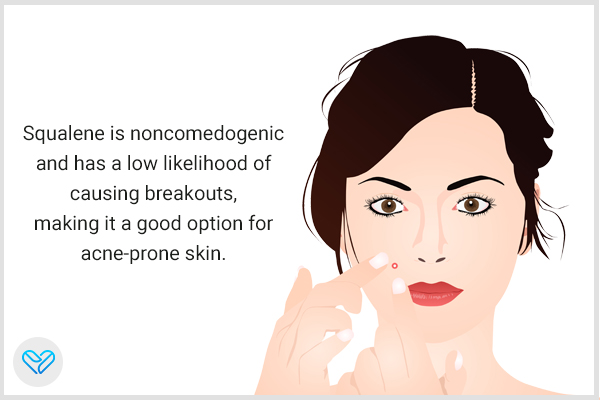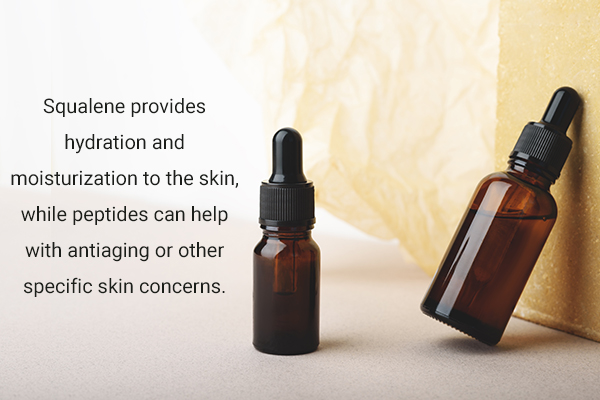In this article:
Squalene and peptides are both widely used in skin care products for their unique properties. Squalene is a weightless, nongreasy oil derived from plants that helps moisturize and protect the skin. (1)(2) Peptides, on the other hand, are short chains of amino acids that can deliver diverse advantages such as promoting collagen production and improving skin elasticity. (3)

These two ingredients offer distinct advantages and can be incorporated into your skin care routine based on your specific skin concerns and goals.
Squalene Versus Peptides: Which One Should You Choose
Understand these factors before choosing one:
| Squalene | Peptides |
|---|---|
| Preferred more for oily/acne-prone skin | Preferred more for dry skin |
| Good for moisturizing the skin | Good for skin aging |
| Well tolerated by sensitive skin | Only some peptides are well tolerated by sensitive skin |
Decide which product is suitable for you after considering these factors.
Skin type
Squalene is a lightweight oil that works well for all skin types. Peptides are generally suitable for all skin types as well. (4) So, no matter what skin type you have, you can use either.
However, people with sensitive, oily, and acne-prone skin are recommended to opt for squalene as it is noncomedogenic, meaning it provides benefits without clogging pores. (2)
Hydration requirement

If your primary concern is maintaining optimal skin hydration, squalene may be the better choice due to its excellent moisturizing properties. In simple terms, squalene has been found to have a hydrating action on the skin.
Researchers discovered that vernix caseosa (VC), which contains squalene, can act as a barrier cream for skin that lacks its natural protective layer. VC helps to keep the outer layer of the skin hydrated, allowing it to retain moisture better. (1)
Skin sensitivity
If you have sensitive skin, squalene is the gentler option as it is well tolerated and less likely to cause irritation. It has also been deemed safe for use in sensitive skin by researchers. (2)
When it comes to the use of peptides in sensitive skin, the verdict is not clear yet. A few peptides such as acetyl dipeptide-1 cetyl ester, palmitoyl tripeptide-8, and acetyl tetrapeptide-15 have evidence supporting their efficacy for sensitive skin, but most of the available data are found in supplier brochures rather than from rigorous clinical studies.
So, while peptides can be useful in cosmetics for sensitive skin, more research is needed to fully understand their effectiveness and develop even better ingredients. (5)
Aged skin
Peptides are famous for their antiaging effects, as they can facilitate collagen production and enhance skin elasticity, making them a suitable option if you’re targeting indications of aging such as wrinkles. (3)
Also, skin ages prematurely due to factors such as oxidative stress caused by reactive oxygen species (ROS) from respiration, pollutants, toxins, and UVA rays. Antiaging peptides are valuable compounds that help remove ROS and prevent premature skin aging. (6)
Acne-prone skin

Squalene is noncomedogenic and has a low likelihood of causing breakouts, making it a good option for acne-prone skin. Peptides, while not specifically used for acne, can still be beneficial for overall skin health. (4)
What Is Squalene in Skin Care?
Squalene is a natural substance found in oils such as shark liver, olive, and rice bran. It’s a special ingredient that does wonders for your skin.
It keeps your skin moisturized, protected, and healthy. With powerful antioxidants, it fights damage and keeps your skin hydrated.
Skin care products use squalene to make your skin appear and feel its most beautiful. (7)
Some of the benefits of squalene are:
- Protects the skin from damage
- Keeps the skin soft without greasiness
- Locks in moisture for hydration
- Fights signs of aging
- Reduces skin irritation and redness
What Are Peptides in Skin Care?
Peptides have been used in skin care since 1973 when a synthetic peptide called GHK was discovered to enhance collagen production. Since then, many different peptides have been developed to address common concerns in the cosmetics industry.
The advantages of peptides for the skin are: (7)
- Peptides are commonly used in antiaging products to promote collagen production and regulate its turnover, helping to reduce the appearance of wrinkles and maintain youthful skin.
- Some peptides can temporarily improve skin firmness by affecting neurotransmitters, resulting in a smoother look and a reduction in fine lines.
- Peptides can help counteract the effects of external factors such as pollution and oxidative stress, which can contribute to skin aging.
Potential Side Effects of Squalene and Peptides
Squalene and peptides are generally safe to use for most people. However, there is a small possibility of experiencing skin irritation or allergic responses.
It’s important to conduct a patch test before using new products and to stop using them if any negative reactions occur.
Can You Use Squalene and Peptides Together?

Yes, you can use squalene and peptides together in your skin care routine. Squalene and peptides serve different purposes and can complement each other’s benefits.
Squalene provides hydration and moisturization to the skin, while peptides can help with antiaging or other specific skin concerns.
Most-Asked Questions
Does squalene plug up pores?
No, squalene is a lightweight oil that is noncomedogenic and does not obstruct the pores.
Are peptides and squalene suitable for all skin types?
Peptides and squalene are suitable for most skin types, but individual preferences and sensitivities may vary. Patch testing is recommended.
How long does it take to notice the effects of using peptides?
Results from using peptides can vary, but noticeable improvements in skin texture and firmness may be seen after several weeks of consistent use.
Can squalene benefit those with dry skin?
Yes, squalene is known for its hydrating action and can help refill moisture back in dry skin.
Can peptides help with acne?
Some peptides have antibacterial properties that may help with acne, but it’s important to choose products specifically formulated for acne-prone skin.
Is squalene suitable for oily skin?
Yes, squalene is a lightweight oil that can be beneficial for oily skin as it provides moisture without making the skin feel heavy or greasy.
Are peptides and squalene natural ingredients?
Peptides can be derived from natural sources, while squalene is naturally found in plants and animals, making them both natural ingredients.
Final Word
Both squalene and peptides deliver outstanding advantages for the skin. Squalene provides hydration and moisturization, while peptides support collagen production and address specific skin concerns. Incorporating both squalene and peptides into your skin care routine can help promote healthy, nourished, and youthful-looking skin.
- Was this article helpful?
- YES, THANKS!NOT REALLY


